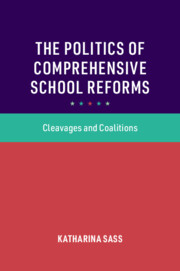Editor
Terry M. Moe, Stanford University
Education and its reform are matters of great political salience throughout the world. Yet as Gift and Wibbels observed, “It is hard to identify a community of political scientists who are dedicated to the comparative study of education.” This series is an effort to change that. The goal is to encourage a vigorous line of scholarship that focuses squarely on the politics of education across nations, advances theoretical thinking, includes a broad swath of educational terrain – from elementary and secondary education to vocational education to higher education – and explores the impacts of education on key aspects of society. The series welcomes books of very different types. Some may be grounded in sophisticated quantitative analysis, but qualitative work is welcome as well, as are big-think extended essays that develop agenda-setting ideas. Work is encouraged that takes on big, important, inherently messy topics, however difficult they may be to study. Work is also encouraged that shows how the politics of education is shaped by power, special interests, parties, bureaucracies, and other fundamentals of the political system. And finally, this series is not just about the developed nations, but encourages new work on developing nations and the special challenges that education faces in those contexts.

